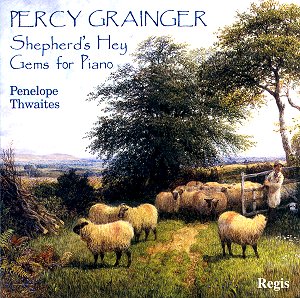This generous helping of the witty and charming music
of Percy Grainger has been lovingly put together by his compatriot,
the Australian pianist Penelope Thwaites, and excellent playing it all
is too. One has this image from Ken Russell’s film of the wacky Grainger
pushing Delius’s bathchair downhill at breakneck speed or charging through
the house to catch successfully a tennis ball he has just thrown over
the roof from the back to the front. Occasionally this music brings
such images to mind. But he was more than just dotty. The very first
track, The Power of Love, was written after his mother committed
suicide by jumping from a New York skyscraper in 1922, and is an intensely
moving piece of music, while the last of the three constituting this
suite is derived from folksong, a hugely important influence in Grainger’s
musical thinking. Such folksong arrangements continue in familiar English
vein as the disc proceeds. In the hauntingly grandiose Colonial Song
(with its interesting chords in its latter stages), and one senses a
desire to employ twenty-one pianos at the climaxes rather than just
one, with all those glissandi not really an adequate solution. To conclude
this CD there are three arrangements by Grainger (discreetly done it
must be said) of the music of three completely varied composers - you
cannot conceive of a more bizarre journey than from Fauré back
to Dowland via a very camp Flower Waltz from Tchaikovsky’s Swan
Lake. It is a nice touch for Ms Thwaites to bid farewell to her
listener in the last track with such a highly appropriate title, though
whether Dowland would have come up with some of those final harmonisations
is highly questionable.
Penelope Thwaites is a formidable pianist, always imbuing
her playing with a colourful palette of mood and tone. Some of the works
are exceedingly complex (occasionally more suited to other versions
made by Grainger himself for two pianos), others notably simple. Not
all the songs were the fruits of Grainger’s collecting labours. Cecil
Sharp was, for example, responsible for the familiar Country Gardens.
But Grainger’s work in this field from 1906 onwards was both vitally
important and technically imaginative, notating precise rhythms of the
singers by slowing down the recording process using a phonograph, hence
the varying time signatures in the piano scores of these tunes. He even
goes so far as to ask the pianist to imitate an Aeolian harp in The
Knight and the Shepherd’s Daughter. Further eccentricities abound,
such as using the fist to play the final bars in Country Gardens,
which puts a new slant on Morris dancing. Occasionally one feels an
urge to call out ‘get on with it’ but once he does just that, the music
has that irresistible Graingeresque rhythmic swagger. Country Gardens
is an unbeatable tune (so too are Handel in the Strand and Shepherd’s
Hey), beautifully arranged, and impressively played here (Grainger
was himself a pianist of considerable prowess). In short, a highly satisfying
mix of familiar fare with less commonly heard music by this fascinatingly
original composer and strangely complex man.
Christopher Fifield


